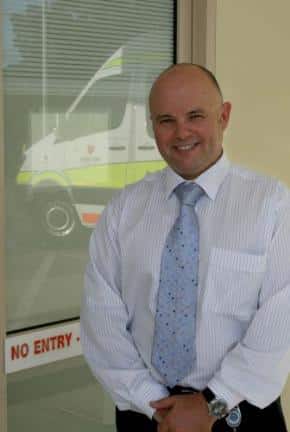
Hunter researchers are reminding people in the Upper Hunter, Great Lakes and Lower Manning areas to call ‘000’ if they recognise the signs of stroke so that more people can benefit from brain-saving treatment.
Hunter researchers are reminding people in the Upper Hunter, Great Lakes and Lower Manning areas to call ‘000’ if they recognise the signs of stroke so that more people can benefit from brain-saving treatment.
As part of a research trial being conducted by the Hunter Medical Research Institute (HMRI) Stroke Research Group and the Ambulance Service of NSW, people who experience a stroke in the Upper Hunter, Great Lakes and Lower Manning areas now have access to brain-saving clot busting treatment.
“If Ambulance is notified of the stroke immediately and they assess the patient as likely to benefit from stroke treatment, they can be flown by helicopter or transported by ambulance directly to John Hunter Hospital in Newcastle for treatment,” said Associate Professor Chris Levi, a member of the HMRI Stroke Research Group and Director of Acute Stroke Services at John Hunter Hospital.
“Clot busting (thrombolysis) treatment can be highly effective in dissolving blood clots in the brain and reducing disability from stroke, but it must be administered within three hours.
“It is crucial that people recognise the signs of stroke – facial weakness, arm weakness and speech difficulties – and immediately seek help by dialling ‘000’ and informing the telephone operator of the stroke.”
For more information about this study visit hmri.net.au where you can read about the trial or watch a video interview with a stroke survivor who has benefitted from clot busting treatment.
Each year in Australia 60,000 strokes occur – one every 10 minutes.

HMRI is a partnership between the University of Newcastle, Hunter New England Health and the community.
HMRI would like to acknowledge the Traditional Custodians of the land on which we work and live, the Awabakal and Worimi peoples, and pay our respects to Elders past and present. We recognise and respect their cultural heritage and beliefs and their continued connection to their land.

Hunter Medical Research Institute
We’re taking healthy further.
Locked Bag 1000
New Lambton
NSW, Australia, 2305



This site is protected by reCAPTCHA and the Google Privacy Policy and Terms of Service apply.
Copyright © 2024 Hunter Medical Research Institute | ABN: 27 081 436 919
Site by Marlin Communications
